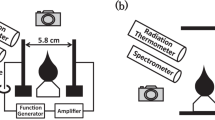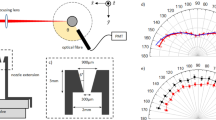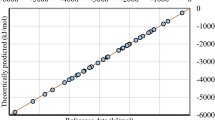Abstract
THE gases remaining after flame has spread through an inflammable mixture are not just hot normal gases. The view has been put forward1 that they contain a considerable latent energy in stable form. This probably resides in a proportion of the newly formed triatomic molecules as excess intra-molecular energy which cannot be handed over to the translational degrees of freedom. In virtue of the excess intra-molecular energy, it would appear that there is a much larger dissociation in flame gases than in normal gases of the same composition under similar conditions of temperature and pressure.
This is a preview of subscription content, access via your institution
Access options
Subscribe to this journal
Receive 51 print issues and online access
$199.00 per year
only $3.90 per issue
Buy this article
- Purchase on Springer Link
- Instant access to full article PDF
Prices may be subject to local taxes which are calculated during checkout
Similar content being viewed by others
References
David, Phil. Mag., 23, 345 (1937).
David, Engineering, 531 (Nov. 12, 1937).
Author information
Authors and Affiliations
Rights and permissions
About this article
Cite this article
DAVID, W., PUGH, B. Latent Energy and Dissociation in Flame Gases. Nature 145, 896–897 (1940). https://doi.org/10.1038/145896a0
Issue Date:
DOI: https://doi.org/10.1038/145896a0
This article is cited by
-
Atomic Oxygen and Dissociation in Flame Gases
Nature (1948)
-
Abnormal Dissociation in Flame Gases
Nature (1944)
-
Influence of Water Vapour on Flame Gas Temperatures
Nature (1942)
Comments
By submitting a comment you agree to abide by our Terms and Community Guidelines. If you find something abusive or that does not comply with our terms or guidelines please flag it as inappropriate.



